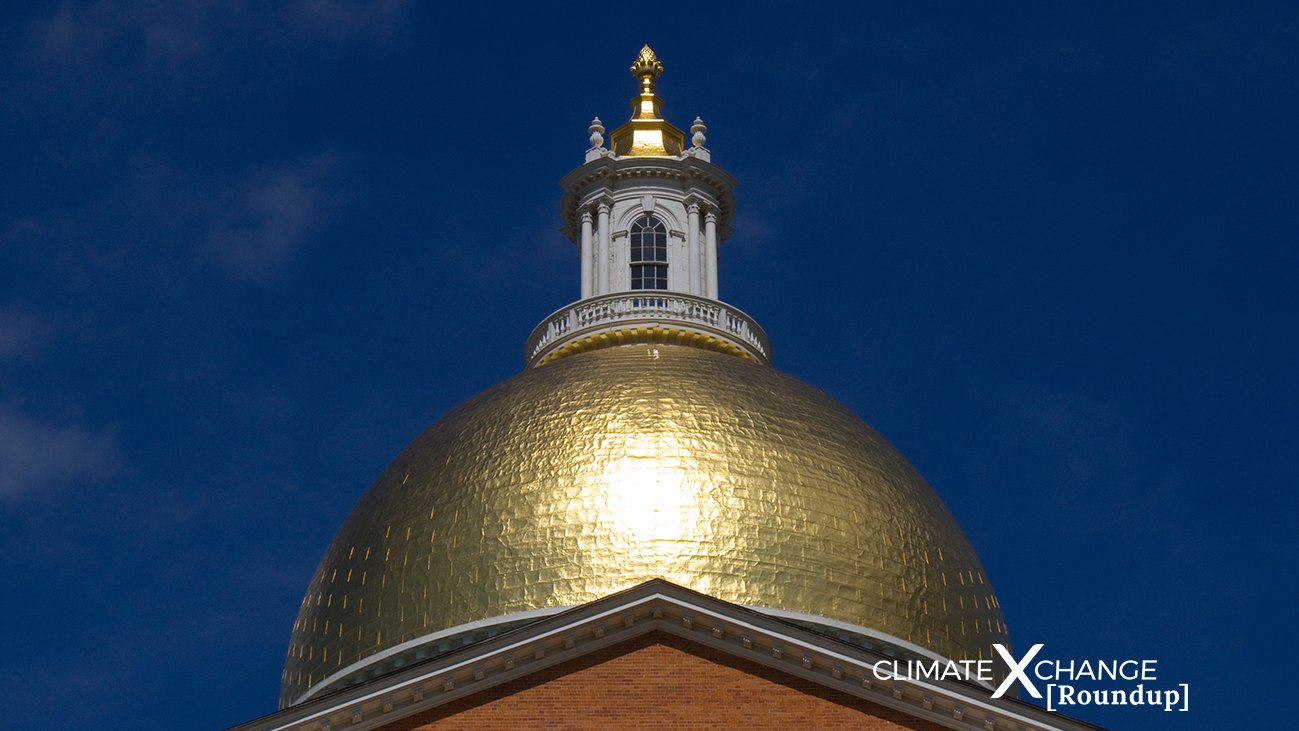[ Not a subscriber? Sign up here ]
BEACON HILL HAPPENINGS
– Coronavirus fears disrupt legislative work, climate advocacy on Beacon Hill: The statehouse is not immune to the wide-reaching impacts coronavirus is having on Massachusetts. In an email to lawmakers on Tuesday, House and Senate leaders ordered the “cancelling [of] all public events for the foreseeable future,” through at least April 9th. This led to the postponing of multiple events and forums, such as a ‘Business Leaders for Climate Solutions Day’, previously scheduled for April 9th. Despite canceling events, the statehouse is to “remain open to the public for the time being,” although lawmakers are encouraged to shift in-person meetings to other formats such as phone or video conferencing.
One environmental advocate, speaking off the record, thinks the big unknown is what is going to happen to the legislative calendar. They think it’s safe to assume that the statehouse will close down for a period of time or that legislative activity will be dramatically scaled back. The email sent to lawmakers on Tuesday didn’t explicitly mention whether formal session (during which lawmakers vote on major bills) would be canceled, but did say that “members should continue to check the weekly schedule for updates on session.”
Another advocate pointed to potential fiscal impacts the virus might have on the state budget. House and Senate leaders are expected to vote today on a $15 million aid package aimed at bolstering the state’s response to the virus. Beyond that, the Joint Ways & Means Committee has postponed public hearings on the budget for the time being. Both steps will likely impact the ability of advocates to get changes to the budget, like ones that direct more funding on climate action and the environment. Additionally, any economic slowdown resulting from the disease would further reduce tax revenue going towards the state, putting additional pressure on the budget.
– The complicated climate politics of the gas tax on Beacon Hill: Last week the House passed a transportation revenue bill set to generate upwards of $600 million in revenue for infrastructure including the MBTA and roadways. Revenue is raised through new fees on ride-sharing companies like Uber and Lyft, but also through a 5 cent tax increase on gasoline. Although this gas tax is likely to reduce emissions, similar to a carbon price, backers of the latter policy are not necessarily enthusiastic in their support. Part of it comes downs to focus. The primary goal of a gas tax is to generate revenue, whereas the primary goal of a carbon price is the reduce emissions. Because a carbon price focuses on emissions reduction, any revenue from it goes back into projects that significantly reduce emissions. Like a gas tax, this can include public transportation but unlike a gas tax, this would not including expanding infrastructure for traditional fossil fuel burning vehicles.
Further, a gas tax runs counter to the goals of some climate advocates, who see it as placing more of a burden on low-income households. Compare this to H.2810, a carbon price proposed by Rep. Benson in 2019, that would rebate 70% of revenue from the fee back to individuals (with more revenue going to low-income families). Finally, the House’s bill is seen as being too limited in its ability to reduce emissions. This is both because of the amount of reduction expected from only a 5 cent gas tax and the inclusion of a provision that would walk back any gas tax increase if TCI goes into effect.
Having passed with overwhelmingly support from House members, the bill is now before the Senate. The Senate is willing to consider most proposals within the House’s transportation funding bill (with revisions), but the same can’t be said of Governor Baker who has threatened a veto.
– AG Healey Joins Coalition Opposes Trump Rollback of the National Environmental Policy Act: “Massachusetts Attorney General Maura Healey joined a coalition of 20 attorneys general in calling on the Trump Administration to abandon its proposed rule gutting the National Environmental Policy Act (NEPA), a federal law that requires federal agencies to comprehensively assess the impact of their actions on the environment.” [full press release]
– “Healey calls for exploring expanded carbon pricing” (Bruce Mohl, Commonwealth Magazine): [read the article]
– “Moore sends letter to AG on PFAS’ public health risks” (the Millbury-Sutton Chronicle): [read the article]
ALL POLICY IS LOCAL
– AG Healey joins coalition opposes Trump rollback of the National Environmental Policy Act: “Massachusetts Attorney General Maura Healey joined a coalition of 20 attorneys general in calling on the Trump Administration to abandon its proposed rule gutting the National Environmental Policy Act (NEPA), a federal law that requires federal agencies to comprehensively assess the impact of their actions on the environment.” [full press release]
– “Healey calls for exploring expanded carbon pricing” (Bruce Mohl, Commonwealth Magazine): [read the article]
– “Moore sends letter to AG on PFAS’ public health risks” (the Millbury-Sutton Chronicle): [read the article]
LOCAL IDEAS
– “Open Letter to the Massachusetts Legislature” by Bill Mckibben, via the Greenfield Recorder.
– “The fiscal challenges of climate change” by Linda Shi, via the Boston Globe.
– “The coronavirus emergency should make us act on the climate crisis” by Scot Lehigh, via the Boston Globe.
– “It’s time for action on the climate crisis, not talk” by Kit Sang Boos, via the Daily Hampshire Gazette.
– “Electric cars, the EPA, and us” by Jack Fruchtman, via the MV Times.
LOCAL CLIMATE SPOTLIGHT
– “How The Supreme Court Made ‘Climate History’ In Massachusetts V. EPA” (Jeremy Hobson & Samantha Raphelson, WBUR): “One Supreme Court decision sparked some of the most significant actions taken by the U.S. government to deal with climate change. Massachusetts vs. Environmental Protection Agency was decided in a 5 to 4 ruling in 2007. It laid the groundwork for many of former President Obama’s climate policies, including the Clean Power Plan.”
THE GREEN ECONOMY, STUPID
– Acadia Center releases outline for achieving heating emissions reductions: On Tuesday the Acadia Center released ‘Clean Heating Pathways,’ a report that looks at policy pathways cities and states can take to reduce emissions from the heating of homes and water. Specifically, the report describes the need for thermal decarbonization, details the positive environmental and consumer financial impacts of beneficial electrification, and shows which states have made progress on policies that will achieve these benefits. Read the full report here.
– “Massachusetts Pursues New Climate Goals With Help From Local Clean Tech Industry” (Hannah Uebele, WGBH) [read the article]
– “New England Solar Booms—But Erosion and Other Problems Pile Up” (Adrianne Appel, Bloomberg Environment): [read the article]
– “Wind, solar and storage take up 95% of ISO-New England interconnection queue, marking ‘dramatic shift’” (Iulia Gheorghiu, UtilityDive) [read the article]
BEYOND THE BAY STATE
– “How municipalities are playing a part in solving the climate crisis” (Carlie Clarcq, Climate XChange): [read the article]
– “Despite its opponents, CMP corridor project well underway” (Tux Turkel, Portland Press Herald): [read the article]
– “N.H. Town Meetings to Vote on Call for Carbon Fee & Dividend” (Annie Ropeik, NHPR): [read the article]
INSIDE THE BELTWAY
– “U.S. Agriculture set to tackle carbon emissions with USDA plan” (Carlie Clarcq, Climate XChange): [read the article]
ROUNDUP REDUX
Missed the last CXC Roundup? Here are the top three climate headlines from last week:
- “For Governor Baker, shifting Mass. to greener electricity is proving to be a sticky saga”
- Keep an Eye on the Massachusetts 2050 Roadmap Bill
- “Municipal aggregation savings ‘shattering expectations’ in Massachusetts”
Read the full Roundup here from March 5th, 2020 here.
FOR MORE CONTENT from us subscribe to the Climate XChange Newsletter (Fridays, weekly) or the Climate Action Business Association Newsletter (Fridays, bi-weekly).









